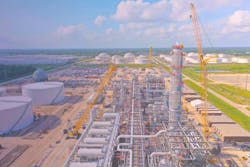Next Wave brings Texas ethylene-to-alkylate plant online
Next Wave Energy Partners LP has commissioned its long-planned Project Traveler ethylene-to-alkylate production plant at the operator’s 53-acre site in Pasadena, Tex., adjacent to the Houston Ship Channel (OGJ Online, Nov. 21, 2019).
Project Traveler achieved commercial operations as of Mar. 20 and is now producing low-sulfur, high-octane, low-RVP alkylate with zero olefins—marketed under the trade name Optimate—as a gasoline blending component to help meet North America’s increasing demand for cleaner-burning fuels, New Wave said.
First announced in 2019 and previously scheduled for start-up in mid-2022, Next Wave’s Project Traveler plant is equipped with a nameplate capacity to consume 1.2 billion lb/year of ethylene feedstock to produce high-quality alkylate blendstock for the gasoline market (OGJ Online, Feb. 6, 2020).
On its website, Clough Ltd. of Australia confirmed its delivery of engineering, procurement, construction, and commissioning (EPPC) services for the Project Traveler complex.
Future development plans
Alongside confirming startup of Project Traveler, Next Wave also revealed works are already underway to improve and expand operations.
“The Next Wave platform—anchored by Project Traveler—is well positioned for cost-effective expansions of Optimate production capacity, while also retaining the optionality to vertically integrate into upstream renewable feedstocks and downstream renewable chemical and fuels products,” said Michael Bloesch, Next Wave’s president and chief executive officer.
In addition to beginning engineering work to debottleneck and increase capacity at Project Traveler, Next Wave said it is in the development stage for Project Lightning, a second project at the Pasadena site that would leverage existing assets to enhance optionality of the Next Wave platform by converting renewable feedstocks into chemical building blocks used in manufacturing of various specialty products such as net-zero carbon plastics and sustainable aviation fuel (SAF).
Project Lightning specifically would use a feedstock of ethanol for production of bio-ethylene, renewable Optimate (alkylate), and SAF. The project also would include a metathesis unit to provide optionality for converting ethylene and bio-ethylene into propylene and bio-propylene, respectively, according to the operator.
“Although the composition of global energy supplies will evolve over many years, Next Wave is firmly positioned to deliver drop-in solutions that improve energy efficiency and reliability and contribute to the decarbonization of our planet, both now and into the future,” said Patrick Diamond, the company’s executive chairman and founding partner.
Next Wave did not reveal a proposed timeline for the proposed Project Lightning.
About the Author
Robert Brelsford
Downstream Editor
Robert Brelsford joined Oil & Gas Journal in October 2013 as downstream technology editor after 8 years as a crude oil price and news reporter on spot crude transactions at the US Gulf Coast, West Coast, Canadian, and Latin American markets. He holds a BA (2000) in English from Rice University and an MS (2003) in education and social policy from Northwestern University.

